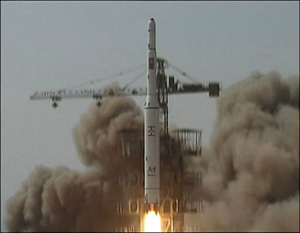
North Korean Rocket Launch:
Shaking up the World?
By Lim Seon-hye, Tribune Reporter
On April 5th, North Korea launched a three-stage long-range rocket named “Unha-2” built in Kwangmyoungsung-2. Other nations proclaimed that it might be a missile and not a satellite. It failed to achieve orbit, indicating that this rocket launch violated United Nations Security Council Resolution 1718 prohibiting North Korea from conducting ballistic missile-related activities. Contrary to this, North Korea insisted it was just a satellite for space research and succeeded in sending the satellite into orbit.
In any case, it is evident that this launch demonstrated North Korea is striving to possess intercontinental ballistic missile capability. Some nations, including Japan, the United States and other Pacific nations, regarded North Korea’s rocket launch as a serious menace to their safety and worried about it. Let’s see how foreign news agencies reported about this event and the position they took for it.
The Economist, a United Kingdom economic periodical, reported about North Korea’s rocket launch concentrating on the responses of other nations on April 5th. It said the six-party process on North Korea’s nuclear weapons program has to be restarted expeditiously. By indicating that “sometimes indifference is the best response,” it pointed out that the sensitive responses toward North Korea were inappropriate, and suggested moderate and flexible countermeasures are in need.
The China Daily, a Chinese newspaper in the English language, covered this issue in the article entitled “DPRK Says Successfully Launches Satellite” on April 5th. It expressed its position by supporting North Korea and indirectly said the U.S. thought North Korea launched a missile, took it too seriously and judged the act as a violent action while reporting responses of some other countries. It also said the U.S. has always had a negative view on North Korea’s launch in the same way as the U. S. made critical remarks about the launch of a "Taepodong-1" missile in 1998. On the whole, it seemed to focus on North Korea’s position and tried to report on North Korea’s view.
The Wall Street Journal, a U.S. newspaper, seemed to have a negative view on North Korea and its rocket launch. This newspaper reported that the rocket was the newest step in a program of advanced-weapons development. It also reported the North Korea’s authoritarian government used this development to maintain power and hold leverage against other countries. It said that this launch would be the first test of Barack Obama whether he can rally the international community to punish rogue regime. The phrase ‘rogue regime’ in the article, gives this newspaper’s definite standpoint.
The Financial Times, a British newspaper, reported on April 6th that North Korea’s missile launch was condemned by the international community. Reporting whether success or failure of the launched Kwangmyoungsung-2 from different angles of North Korea and other nations, it carefully added a speculative news story that this ‘successful launch’ would have helped North Korea raise hard currency. Although the international society condemned the missile launch, it could be a turning point for the improvement in the currency of North Korea.
The Daily Star, a Lebanese newspaper said on April 8th that other nations do not have to have hot rhetoric about North Korea's missile launch. It was concerned that other nations, including Japan and the U.S., have attempted to intercept or counter the missile thereby fanning the flames of a military collision. It maintained that what is needed to break long-term sterile cycle is a commitment to steady, patient diplomacy that transcends changes in the political cycle.
As mentioned above, some nations including the United Kingdom and the U.S. have regarded the North Korea’s launch as an attack threatening international peace and security. Others that have close relations with North Korea like China and Russia take a neutral or supporting position on North Korea.
Meanwhile, South Korea keeps looking at related nations’ responses as it carefully measures and makes an effort to cooperate with concerned nations. South Korea has made an effort to protect its residents and industrialists in North Korea preparing for the worst. South Korea has tried to soften the rigid relationship between South and North Korea by requiring conversation and calling upon North Korea to participate in the six-party process.
Now, North Korea has once again become the focus of the geopolitical world. The United Nations Security Council announced on April 24th that they decided to restrain three North Korea’s companies. Economic sanctions are not the best solution. The concerned nations need to have a prudent and pliable response to this situation. This launch is still a sensitive and lasting hot issue in the global society.

